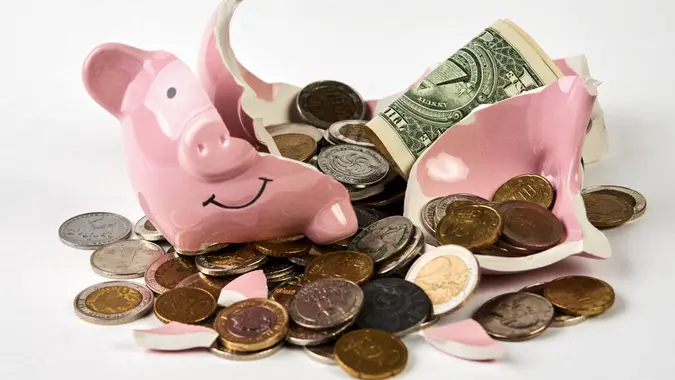5 Banking Mistakes Frugal People Always Make That End Up Costing More

Commitment to Our Readers
GOBankingRates' editorial team is committed to bringing you unbiased reviews and information. We use data-driven methodologies to evaluate financial products and services - our reviews and ratings are not influenced by advertisers. You can read more about our editorial guidelines and our products and services review methodology.

20 Years
Helping You Live Richer

Reviewed
by Experts

Trusted by
Millions of Readers
Being frugal is conventionally encouraged — even lauded — when it comes to lifestyle. But it can end up costing you big when it comes to banking.
Thomas Maluck, certified financial education instructor and owner of Financial Flock, advised against making certain mistakes out of frugality. Below are the top banking traps you can fall into if you’re not careful.
Sticking to a Debit Card
“Frugal people do not like fees or risk, and there is no better way to resist the allure of credit cards and their punishingly high APR than to just stick with a debit card,” said Maluck.
However, he said this strategy also leaves a lot of easy money on the table. “Expanding one’s spending strategy to a single 2% cash-back credit card, with automated payments for each statement balance, will add up to a significant chunk of change in no time.”
He added that the debit-only strategy is also a security risk: Even though banks and credit unions are better these days about helping scammed debit card users, there’s no getting around the fact that a scammer or hacker who breaks into that account is spending the money directly out of your bank account.
“A credit card adds a layer of protection in the form of purchases not immediately representing a withdrawal of your funds,” he explained. “Plus, if all of your money is in one account, that represents a single point of failure in order to access all of your money. A little more complexity can prevent a total loss in a worst-case scenario.”
Keeping Way Too Much Money Stashed in a Checking Account
“Frugality in money management can look simple, such as managing as few accounts as necessary, which is great,” said Maluck.
However, he added, there’s elegance and then there’s stubbornness. For example, stashing all of your cash in a checking account and refusing to entertain higher-yielding options.
“The frugal urge to express control over one’s money by keeping it all in one place is a huge opportunity cost, especially if someone already has enough to cover six months’ worth of emergency expenses,” he said.
Using CDs and Money Market Funds as Sole Investments
Similar to the previous point, Maluck said frugal bank customers can be prone to valuing security over all else, including future returns. “There is nothing wrong with allocating a portion of one’s portfolio to steady, low-risk returns, such as those in a certificate of deposit or money market account.”
He said there are plenty of other options, though, and diversifying some of your long-term money into TIPS or even a globally broad index fund could boost a portfolio’s returns, especially over a longer time frame.
Not Shopping Around for a HYSA With Actual High Interest
Maluck noted that sometimes a frugal person’s rush to savings accounts leads to an ironic result: Banks and credit unions with low interest rates profiting more than you, as a frugal person, ever could.
“In today’s interest rate environment, a 4% interest rate is not hard to find,” he explained, “but there are plenty of financial institutions using the high-yield savings account label while offering between 0.01% to 0.04%.”
In other words, one percent of one percent, or one penny per $100 saved.
“Frugality does not have to mean loyalty to a poor deal when the potential to earn literally hundreds of times more exists,” Maluck said.
Accepting Bank and ATM Fees
“Bank and ATM fees are an example where perfect truly is the enemy of good,” said Maluck. “A frugal person might be convinced that a $2 ATM fee is reasonable compared to another institution’s $5 ATM fee, but they are wrong.”
He said plenty of no-fee options exist when it comes to ATM fees, either through debit cards that are no-fee across a network of machines or no-fee/instant rebate at all ATMs, period. “When it comes to fees for handling your money, low is not the goal — it’s zero.”
 Written by
Written by  Edited by
Edited by 

























